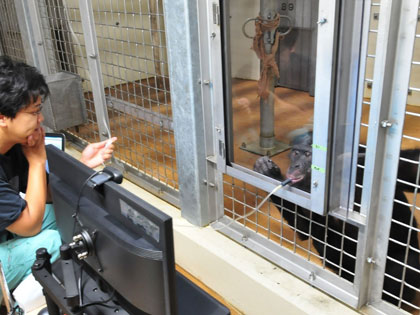Great apes make anticipatory looks based on long-term memory of single events.
Fumihiro Kano, Satoshi Hirata
DOI: 10.1016/j.cub.2015.08.004Read full text
Press Release
Seen Once, Never Forgotten
You don't have to be human to like a good horror flick, Kyoto scientists show
Kyoto, Japan -- Having once seen the shower scene in Alfred Hitchcock's 1960 thriller Psycho, who can forget what happens next?
And it turns out that aside from humans, great apes (in this case, chimpanzees and bonobos) also remember events in films -- and can anticipate what takes place in memorable scenes.
Researchers at Kyoto University's Wildlife Research Center, writing in the journal Current Biology, adapted eye-tracking technology for the apes, enabling the team to rec-ord how the apes were viewing various video clips.
"When shown a video for the second time, after a 24-hour delay, the apes clearly an-ticipated what was coming next," explains first-author Fumihiro Kano. "This demon-strates their ability to encode single-experience events into long-term memory."
The team began by creating two series of short films, King Kong Attack and Revenge to King Kong, in which the apes are shown a familiar sort of environment where rather shockingly unfamiliar events take place. For example in the first series, two doors are visible, but an attacking 'King Kong' (in reality, a researcher dressed in a Kong cos-tume) only emerges from the right or left side. 24 hours later, when shown the film again, the apes' attention focused on the side they had seen previously, even before Kong emerged.
Previous studies in this area have been based on prior long-term training of apes.
"What makes our result unique is that the apes encoded the information after only one viewing," says Satoshi Hirata, a senior member of the team. "This ability should help them avoid impending danger, interact socially, and navigate complex environ-ments."

Cannot be unseen
An ape viewer (upper left) intently watches a test film, anticipating that a researcher dressed
in an ape costume will emerge from the right-hand door (as indicated by red, eye-tracking dots).
Highlights
- We developed a novel eye-tracking task to examine great apes’ memory skills
- Apes watched the same videos twice across 2 days, with a 24-hr delay
- Apes made anticipatory looks based on where-what information on the second day
- Apes thus encoded ongoing events into long-term memory by single experiences